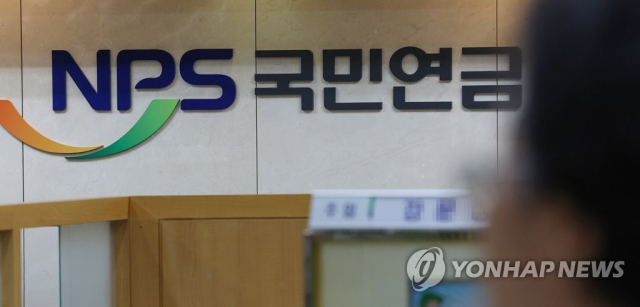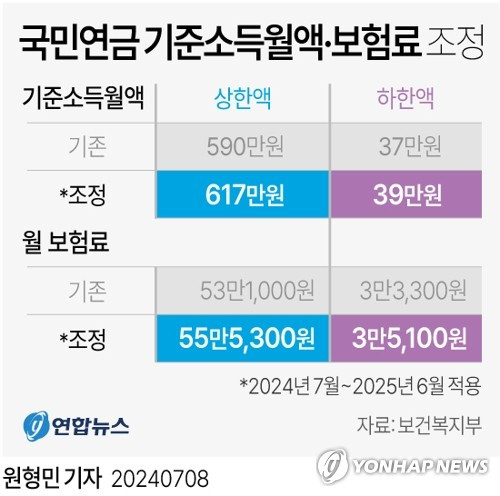Under the principle of sharing insurance premiums equally with the company, the maximum monthly premium will increase to 12,150 won.,

Photo=Yonhap News
,
,
, ‘Due to the adjustment of the upper and lower limits of the standard monthly income, the National Pension insurance premium will increase by a maximum of 24,300 won starting this month.’,
,
, ‘According to the Ministry of Health and Welfare and the National Pension Service, as of July, the upper limit of the standard monthly income has been raised from 590,000 won to 617,000 won, and the lower limit has been raised from 370,000 won to 390,000 won, in line with the average income fluctuation rate (4.5%) of all National Pension subscribers over the past three years. This standard will be applied for a year until next June.’,
,
, ‘The National Pension, along with health insurance, is a representative social insurance, and since it is not a tax, insurance premiums are not imposed unlimitedly regardless of income or property.’,
,
, ‘A cap is set and insurance premiums are only charged at a certain level.’,
,
, ‘The upper limit of 617,000 won means that even if the monthly income exceeds 617,000 won, the insurance premium is collected as if the income is 617,000 won.’,
,
, ‘The lower limit of 39,000 won means that even if the monthly earnings are below 39,000 won, at least 39,000 won is assumed to be earned, and insurance premiums are levied based on that.’,
,
, ‘The National Pension insurance premium is calculated by multiplying the subscriber’s standard monthly income by the contribution rate (9%).’,
,
, ‘As a result, the insurance premium for subscribers with a monthly income of 617,000 won or more will increase from the existing 531,000 won per month (590,000 won × 9%) to 555,300 won per month (617,000 won × 9%), a monthly increase of 24,300 won.’,
,
, ‘For employees, as they share the pension insurance premiums equally with the company, their personal share will increase by half, amounting to 12,150 won per month.’,
,
, ‘Unlike employees, local subscribers will have to pay the increased insurance premiums in full.’,
,
,

,
,
, ‘For subscribers whose monthly income falls between the previous upper limit of 590,000 won and the new upper limit of 617,000 won, their insurance premiums will increase from above zero to below 24,300 won depending on their monthly income. Of course, if they are employees, they will only bear half of this amount.’,
,
, ‘With the adjustment of the lower limit, the insurance premiums for subscribers with monthly incomes below 39,000 won may increase by up to 1,800 won per month, from the existing 33,300 won (37,000 won × 9%) to 35,100 won (39,000 won × 9%).’,
,
, ‘However, there is no change in the insurance premiums for subscribers whose income falls between the previous upper limit of 590,000 won and the new lower limit of 39,000 won.’,
,
, ‘Although some subscribers may see an increase in insurance premiums due to changes in the standard monthly income, they will receive higher pensions in retirement as their personal average monthly income throughout their lives, which is used to calculate the pension amount, increases.’,
,
, ‘The upper limit of the standard monthly income was fixed at 3.6 million won from July 1995 to June 2010.’,
,
, ‘Due to criticisms that it did not reflect the actual income increases of subscribers nearly every year, which led to inadequate pension benefits, the pension authorities have been adjusting the income cap slightly each year since July 2010, based on the average amount (A value) of the three-year average monthly income of all National Pension subscribers.’,
,
,

